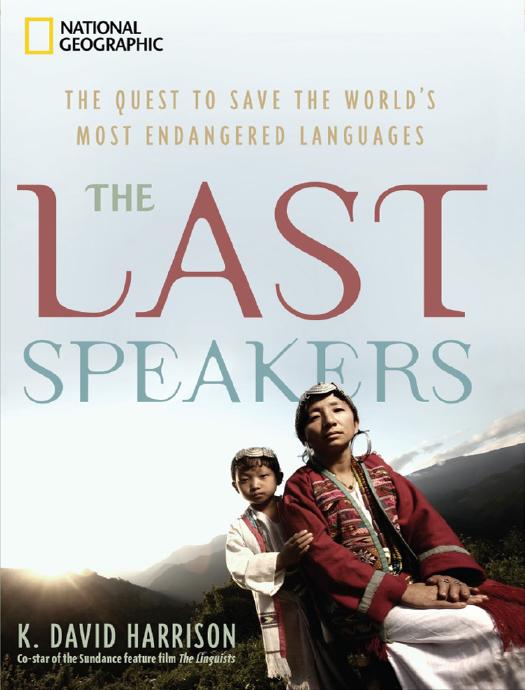The Last Speakers by K. David Harrison

Author:K. David Harrison
Language: eng
Format: mobi, epub, pdf
Publisher: National Geographic Society
Published: 2010-07-22T04:00:00+00:00
{CHAPTER SIX}
SIX DEGREES OF LANGUAGE
The entire world needs a diversity of ethnolinguistic entities for its own salvation, for its greater creativity, for the more certain solution of human problems…indeed, for arriving at a higher state of human functioning.
—Joshua A. Fishman
THE FAMOUS TRIVIA GAME “Six Degrees of Kevin Bacon” was designed to show that all people on Earth can be connected by just a few links. The odds are very good that you know someone who knows someone who knows someone…who knows Kevin Bacon (or anyone else). Every person in the “human web” is linked to every other person, if this principle holds true, by a chain of no more than five people. What started out as an amusement has become a serious research effort at the heart of the emerging science of social networks. We are all connected, and it is language, not film, that plays the greatest role in spinning the links between us.
Environments like Facebook provide an easily traceable map of a person’s social networks, the geography of their friendships. If you “friend” me, I can look and see who all your friends are. But the network exists, and governs all our lives, even if we do not have Facebook to visualize it for us. Entire societies are built upon the foundation of social networks, and we are all constantly kept busy with their construction, repair, and revision. Social networks transmit information, allow us to feel we belong to various communities, and, like language or ethnicity or social class, help us to draw a firm (even if invisible) boundary between “us” and “them.” Humans are driven to separate themselves and segregate into groups, and everyone belongs to multiple social groups that inspire varying degrees of allegiance. Languages are one of the most effective ways to signal group membership, and we are hypersensitive to even minor differences in pronunciation and vocabulary. If I say “pop” instead of “soda” in New York, I instantly, with just that one word, signal my status as an outsider to the local community.
Papua New Guinea, with its 800-plus languages, is the extreme example of how languages signal group membership. For reasons we don’t fully understand, a relatively small population of seven million people, belonging to small groups in constant contact with other groups, has, instead of converging on a common language, kept a massive number of distinct ones. This unique situation sheds light on some mysteries about how languages function in social networks.
If you use Facebook, currently the premier social networking site, you may have drawn a “friend wheel,” a visual representation of all your friends. You are at the center of the wheel, and you (possibly) know all your friends personally. The more interesting question is which of your friends are connected to each other. Clusters of friends appear together on the wheel, which is not surprising, since, for example, everybody in my high school senior class of 60 knew each other. More surprising are links between two friends who happen to know each other and don’t know anyone else in common except me.
Download
The Last Speakers by K. David Harrison.epub
The Last Speakers by K. David Harrison.pdf
This site does not store any files on its server. We only index and link to content provided by other sites. Please contact the content providers to delete copyright contents if any and email us, we'll remove relevant links or contents immediately.
Sapiens: A Brief History of Humankind by Yuval Noah Harari(14389)
Sapiens by Yuval Noah Harari(5372)
Pale Blue Dot by Carl Sagan(5009)
Homo Deus: A Brief History of Tomorrow by Yuval Noah Harari(4918)
Livewired by David Eagleman(3775)
Origin Story: A Big History of Everything by David Christian(3692)
Brief Answers to the Big Questions by Stephen Hawking(3435)
Inferior by Angela Saini(3316)
Origin Story by David Christian(3202)
Signature in the Cell: DNA and the Evidence for Intelligent Design by Stephen C. Meyer(3138)
The Gene: An Intimate History by Siddhartha Mukherjee(3098)
The Evolution of Beauty by Richard O. Prum(2997)
Aliens by Jim Al-Khalili(2830)
How The Mind Works by Steven Pinker(2816)
A Short History of Nearly Everything by Bryson Bill(2698)
Sex at Dawn: The Prehistoric Origins of Modern Sexuality by Ryan Christopher(2529)
From Bacteria to Bach and Back by Daniel C. Dennett(2485)
Endless Forms Most Beautiful by Sean B. Carroll(2483)
Who We Are and How We Got Here by David Reich(2437)
